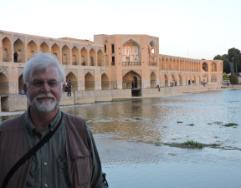
PHOTO: Dr. Patrick Hotle in Esfahan, Iran, in 2015
Dr. Patrick Hotle will attend a conference from January 31 through Feb 2 hosted by the University of Haifa in Israel entitled “The Latin East in the 13th Century: Institutions, Settlements and Material Culture.” This commemorates the 800th anniversary of the Fifth Crusade (1217-21). Hotle will be chairing a session entitled “Planning for Crusade and Crusading in the Thirteenth and Fourteenth Centuries.”
The Fifth Crusade was an attempt under the leadership of popes Innocent III and Honorius III to recapture Jerusalem and the holy land by attacking through Egypt. Initially the Crusader army made of contingents of Hungarians, Austrians, Germans, Flemish and Dutch soldiers was successful at Damietta. However, when they marched on Cairo the Egyptians under Sultan Al-Kamil used the Nile River to flood the Crusader Army. They were forced to surrender and return to Europe. The Crusade was notable for its size and expense as well as the presence of St. Francis of Assisi who attempted to convert the sultan.
Hotle will extend his stay in Israel by a couple days in order to visit and collect information on Acre, the well-preserved last capital of the Kingdom of Jerusalem; its fall to the Egyptian Mamluks in 1291 marked the end of the Crusader states in the Levant. Hotle teaches a course at Culver-Stockton College about the history of the Middle East and the age of the Crusades. During this class, Hotle also features Acre as the location of a simulation called “The Second Crusade: The War Council of Acre, 1148.”
Contact the Marketing & Public Relations Office, at pr@culver.edu or 573-288-6000 ext. 6728 for more information.
NOTE: A number that appears immediately after a person’s name (i.e. Jane Doe ’18) is a reference to the year that person earned their bachelor’s degree from Culver-Stockton.
